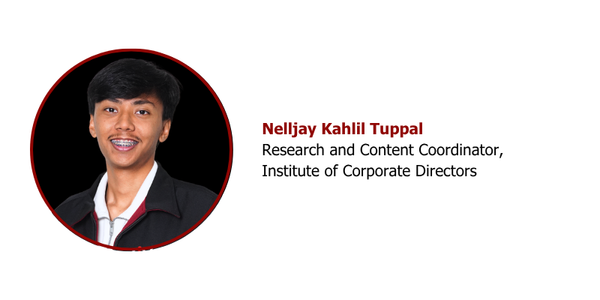ICD Hosts “Board Insights: National AI Strategy,” Spotlighting Governance in the Age of Artificial Intelligence
- ICD Institute for Corporate Directors

- Aug 8, 2025
- 3 min read
Updated: Aug 11, 2025
By: Nelljay Kahlil Tuppal
Research and Content Coordinator, Research and Development
Institute of Corporate Directors
Makati City, July 7, 2025 — As artificial intelligence (AI) continues to transform industries and public institutions worldwide, the Institute of Corporate Directors (ICD) brought together corporate leaders, governance experts, and policymakers for its event, Board Insights: National AI Strategy, held at Dusit Thani Manila and streamed online.
The forum explored how AI is shaping national development and changing the way companies are governed. Organized by ICD’s Membership and Technology Governance Committees, the event aimed to help directors and senior leaders understand the responsibilities and opportunities brought about by AI.
The event began with a solemn invocation, followed by warm welcomes to both in-person and online attendees. Atty. Benedicta Du-Baladad, FICD, Chairperson of ICD, opened the session by emphasizing AI as a national priority.
“We’re here to talk about artificial intelligence as a national imperative,” she said. “Embracing AI with a clear purpose and strategic intent could open new opportunities for growth, improve public services, build smarter institutions, and respond to the evolving needs of our people.”
She also raised important questions for leaders: How do we adopt AI responsibly? How do we govern its use while still encouraging innovation?
Keynote Insights: A National Vision for AI
DOST Secretary Renato Solidum Jr.
Introduced by Ms. Ida Tiongson, FICD, Vice-Chairperson of ICD, Secretary Solidum presented a comprehensive update on the National AI Strategy (NAIS) and the Philippines’ rising global innovation standing.
“Innovation is more than technology—it is a test of our values and vision,” he said, proudly noting the Philippines’ leap to 53rd place in the Global Innovation Index.
He highlighted how AI is already improving healthcare, agriculture, education, and disaster resilience, and stressed the importance of data sovereignty:
“Data will fuel AI. Without sovereign data, we cannot build reliable systems.”
Secretary Solidum emphasized that innovation must remain accessible, ethical, and responsive to real needs, guided by five pillars: infrastructure, workforce, innovation, ethics, and deployment.
DICT Secretary Henry Aguda, FICD (via video)
Secretary Aguda, who was accompanying the President at another event, shared his keynote through a video message.
“AI is no longer the future—it is now. But with powerful tools come great risks,” he said. “Digital transformation is not just about tech, it’s about people. We must build not just fast systems, but fair ones.”
He echoed the government’s commitment to a digitally empowered Philippines: “No Filipino left offline. No Filipino left behind.”
DICT Atty. Leandro Angelo Aguirre, GICD
Representing DICT, Atty. Aguirre stressed that AI governance must be local and context-specific.
“We cannot simply copy what other countries are doing. AI must reflect our own realities.”
He clarified that while there’s no dedicated AI law yet, several existing laws already govern aspects of AI. He advocated for regulatory balance, cautioning against both over- and under-regulation, and emphasized the need for stronger inter-agency collaboration.
Panel Discussion
In the afternoon, the panel discussion—moderated by Mr. VJ Africa, FICD—featured DOST Secretary Solidum and Atty. Aguirre. The session tackled pressing questions around:
Expanding scholarships in STEM
Regulating AI in public services
Energy demands of AI data centers
Creating job-ready training programs
Adopting global regulatory frameworks with local context
Both panelists reiterated the importance of reskilling the workforce, leveraging DOST’s infrastructure, and aligning AI efforts under the National Innovation Council, led by the President, to ensure a unified whole-of-government approach.
Attendee questions sparked discussion on data readiness, digital infrastructure timelines, and practical implementation of AI tools in government. The importance of interoperable data standards, especially for disaster response, was also highlighted.
As the event concluded, ICD President Mr. Senen Matoto, FICD, expressed heartfelt thanks to the speakers and moderator for their insights.
Induction of New ICD Members
A special highlight was the Induction of New ICD Members, strengthening ICD’s growing community of governance professionals. Trustee Mr. Donald Patrick Lim, FICD, led the induction and oath-taking ceremonies.
Newly Inducted Members:
Fellows (FICD):
Rev. Msgr. Roger Joseph B. Erestain, FICD
Joselito Mallari Jr., FICD
Graduate Members (GICD):
Atty. Leandro Angelo Aguirre, GICD
Aaron Jon Atienza, GICD
Atty. Celine Melanie Dee, GICD
Brent Estrella, GICD
Associate Members (AICD):
Freniel Mikko Austria, AICD
Joseph Feliciano, AICD
Charting the AI Journey Together
Board Insights: National AI Strategy affirmed the Philippine government’s serious commitment to using AI for inclusive development, backed by ethical guardrails and responsible governance. The open dialogue between public and private sector leaders made one thing clear: advancing AI in the country is not a task for government alone, but a collaborative national effort.
With the support of the ICD community and a broad range of stakeholders, the Philippines is steadily building a future where AI becomes a powerful tool for innovation, resilience, and inclusive growth.

%20(1).png)




Comments